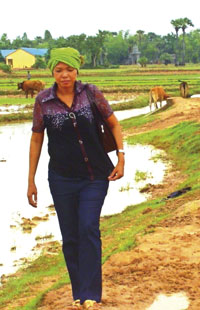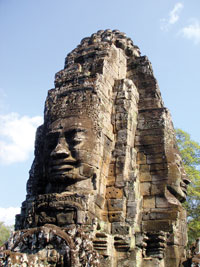HEROINE OF OUR ERAThe Cambodia of today is a safe and booming tourist destination. A mere 40 years ago, it was composed mostly of killing fields, a land of the most heinous genocide of the 20th century, unleashed by Pol Pot. 103rd Meridian East has been privileged to meet a Cambodian woman who survived the rule of the Khmer Rouge and now dedicates her life to helping her fellow countrymen. The story of her life is a chain of the most tragic events, and yet, Soreach Sereithida, who asked us to call her Thida, keeps smiling and hoping for a better future for her native country.
 My name is Soreach Sereithida and I am 52 years old. Now I live a very active and happy life with my grown-up son and daughter. In my youth, however, I had experienced extraordinary and horrible suffering.
I was born in the city of Phnom Penh, the capital of Cambodia, in 1960. I was brought up in a well-off family. We even had two house maids to help my mother with the housework, too. My family was composed of four elder brothers, two younger brothers, my parents and myself. My father worked as a professor at a high school so that our family could get enough income. During the holidays, my father would often take his children out for walks, to the cinema and so on. I had a very happy life in a rather wealthy family.
Both of my parents were highly educated and they used to encourage us to study hard. They wanted each of their seven children to become good people in society and to work for a living. During primary/secondary school, all of my brothers and I enjoyed a much higher level of educa- tion taking French and English evening classes at a private school. I remember studying very hard during my child- hood. It enabled me to skip from Grade 3 to Grade 5, and I finished primary school one year earlier than the others.
Not long before I entered junior high school, the first civ- il war broke out in Cambodia. The Cambodian people fought among themselves and killed each other in the war. Many houses and schools were burnt down, and farms and rice fields ruined by the war. Some of our relatives living in far-away districts were murdered or went miss- ing. Even in the city of Phnom Penh, there were bombings. One of my younger brothers nearly died.
"Whatever will become of us, and what will happen next?" The mere thought of an uncertain future made me sad and uneasy. Then, in April 1975, Pol Pot's army rushed into the capital. Soon after it brought the whole country under its control, it began to force city-dwellers to move to remote villages. Only a few people could be seen on the streets of Phnom Penh when I was 15 years old.
One day, all of my family was forcibly squeezed into a train full of people of the same fate. Along the way, al- most all of our belongings were taken away: food, clothes and even photos. Then we were forced to get onto a truck. While the truck was moving westward, we had no idea at all where we were going. Finally, we found ourselves in a deserted village in Battambang province near the Thai boarder. We could see nothing but wasteland and jungles there. Days of despair started in that de- serted village whose name we had never heard of before.
Children were separated from their parents. I was forced into a mobile working group made up of girls only, and had to work very hard in paddy fields and farms or in a jungle all day long. Grown-ups were mobilised to dig the land in order to build a big dam, only using hu- man labour. Those who grew too weak to work anymore were deserted and died one by one. If someone was overheard complaining about the situation, he or she was sure to be executed. For no less than three years, I had to struggle to sur- vive the hardship of the hell-like village in Battambang.
We would have been
killed if the truth had
been revealed that we
were the family of a professor. My mother insisted that she had earned a
living selling vegetables
in a market. As for me,
I had to pretend that I
could neither read nor
write, as I had also been
selling goods to support
my family. Thus, for fear of death, we had to conceal our true social standing for three years. We also had never experienced such difficult physical labour be- fore and, shortly after, all my family fell seriously ill. We did not have enough food to eat: just one small bowl of porridge for each person per meal. Neither could we see a doctor nor take any medicine however seriously ill we were.
My mother and father, along with all six of my broth- ers, died one by one from severe illness and hunger. Then Vietnamese soldiers marched into the village in Battambang. When Pol Pot's army fled in disor- der from the village, I was discovered in a condition of mere skin and bones from the worst starvation. Nothing was left for me and I felt so lonely and sad that I could hardly sleep at night. 
Then I left the village where there were nothing but sad and cruel memories. I crossed Battambang alone and went to Siem Reap province. I had to find a job to survive there before time could heal my grief that I had lost all of my family. As I had had a very good education in my youth, Iwasabletoworkasa teacher in a rural village there. It was a nominal primary school, with just one room in a tem- ple. I taught children from Grade 1 to Grade 3 together with another teacher. Later, I had the opportunity to study at an institute as a primary nurse for one year. Then I was sent to a primary health centre in a ru- ral village in Siem Reap province. I had to run the centre all by myself, although I had no prac- tical experience and only one year of course training.
I always felt uneasy during those days in Siem Reap because the Vietnamese occupation army kept close watch on whatever I did – anytime, anywhere. I made up my mind to escape from the occupied territory with some neighbours. On the way, we had to hide ourselves in the daytime, and walked throughout the night. We crossed the Khmer-Thai border at risk of our lives and arrived at a refugee camp at last.
At the camp, I was supplied with food and shelter. In due course, I began to study English with a Catholic father there. This enabled me to study as a midwife at the medical school there, while working at the Mother and Child Health Centre sponsored by a UN organisation. After that, I worked as a midwife in the obstetric department of the hospital in the camp. Thus, at the refugee camp, I received opportunities to study that I had lost a long time ago.
I still felt so lonely
at the refugee camp
that I got married
with a member of
the hospital staff,
who was kind to me
at the time. In 1992,
when my family
was repatriated to
Phnom Penh, I had
my second child.
A serious problem
with my husband,
however, compelled
me to separate from
him. I worked and
worked like crazy
for my very young
son and newly-born
daughter. I worked
as an interpreter and
translator, and as field staff as well, for several inter- national organisations and local NGOs.
I was happy to start my life with my two children in my own house, no matter how small it was. I was very happy that both my children were enrolled in a very good school. At last, I could realise my modest dream for the future. It was in 1998 that I started my new life with hope when I heard of Pol Pot's death.
I have been working as Executive Director for a non-governmental organisation named Women Development Association (WDA) since 2003. I would like to encourage marginalised Cambodian women and children to learn how to solve their own problems by themselves. At present, WDA supports those who want to start a business by providing loans, giv- ing vocational training to workers in sewing companies and carrying out various kinds of primary health care programmes. We are working hard, too, for chil- dren in rural villages or slum areas by giving them opportunities for education and organising campaigns to stop child labour.
World history tells us that there are political leaders who might mislead their people into great misery or even destruction. They should learn how to bring everlasting peace to the peo- ples of the world. I believe that peace building through discussion and mu- tual understanding among people in society and all over the world is the best way to eliminate war.
In conclusion, I would be very happy if my life story could help you consider what you could do to estab- lish peace all over the world.
Today, Thida serves as Executive Director of Women Development Association (WDA) located in Phnom Penh. WDA is a non-profit, non-political and non-governmental organisation established by a group of poor women who joined together with the aim of improving the living conditions of people in slum villages in Phnom Penh. Should you wish to donate to or volunteer for Thida's cause, please contact her at:
Ms. Soreach Sereithida
Tel: (+855) 12 955 105
Email: ssereithida@yahoo.com.kh
|
 +65 6696 7068
+65 6696 7068
 info@meridian103.com
info@meridian103.com
 PDA
PDA
 +65 6696 7068
+65 6696 7068
 info@meridian103.com
info@meridian103.com
 PDA
PDA
